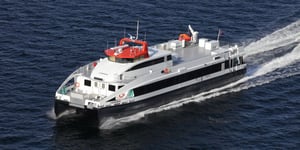Updated 24 November 2025.
Choosing the right propulsion system is one of the most critical decisions you make when designing or upgrading a vessel. The propulsion system directly affects performance, fuel efficiency, emissions, operational costs, comfort, manoeuvrability and long-term reliability.
To help guide your decision, this article outlines eight key performance parameters that should be considered for any vessel type. These parameters remain constant across the industry, but their importance will vary depending on the vessel’s mission and operational profile.
1. Economy: CAPEX & OPEX
Propulsion decisions strongly influence both CAPEX (Capital Expenditure) and OPEX (Operating Expenditure).
-
CAPEX includes the investment required to acquire, install or upgrade propulsion equipment.
-
OPEX includes ongoing expenses such as fuel, maintenance and crew.
Since vessels spend most of their lifetime in operation, OPEX exceeds CAPEX multiple times over the vessel’s lifecycle. This means that a higher initial investment is often justified if it significantly reduces long-term operating costs.
The four major components of OPEX are:
- Fuel
- Salary
- Maintenance
- Finance & Insurance
Selecting the right propulsion system can directly reduce fuel and maintenance costs, the two areas with the greatest savings potential. These savings influence both profitability and environmental impact.
2. Environment
Environment and economy are very strongly linked together, as one of the biggest components of the OPEX is fuel costs. In fact, it can cover as much as 50% of the total OPEX. Consequently, there is a huge potential for costs savings within this area alone – and the bigger the fleet, the more you can save.
Furthermore, decreasing the fuel consumption also reduces the environmental footprint with the same percentage. Additionally, stricter regulations are being introduced and it is crucial to ensure that you do not put a vessel in operation, without it meeting the current environmental requirements.
3. Versatility & Flexibility
Operational versatility increases the value of your vessel. While some vessels are designed for a specific task, many operators benefit from a more flexible design.
A vessel that performs efficiently across multiple operating profiles can:
- Take on a wider range of assignments
- Offer higher utilisation rates
- Improve return on investment
Propulsion systems that maintain efficiency at varying speeds and loads help maximise this flexibility.
4. Reliability
Reliability is fundamentally about having the right equipment for the job, equipment that performs consistently in real-world conditions.
Reliable propulsion systems offer:
- Predictable performance
- Minimal unexpected downtime
- Lower maintenance risk
- Better long-term cost control
Reliability is built on good engineering, careful maintenance and proven technology.
Read more: How to reduce the operational cost of your high-speed vessel
5. Safety – HSE
Safety is a top priority for both operators and passengers. Propulsion technology affects several key safety aspects:
-
Equipment safety: The equipment is reliable and does not break down causing accidents.
-
Vessel safety: What is the crash-stop length? How quickly can you stop the vessel when you are driving full speed?
-
Redundancy: If you have two propellers and one breaks down, can you still maneuver and bring your passengers safely home? Do you have any backup systems?
A vessel with high propulsion-system safety enables predictable, secure operations and reduces the likelihood of costly incidents.
6. Adaptability
With rapid developments in new energy sources (e.g., hybrid, battery-electric, hydrogen-based solutions), long-term adaptability is becoming essential.
A modern propulsion system should be able to:
- Integrate new energy sources
- Support hybridisation
- Scale or upgrade as technology evolves
This ensures durability and helps future-proof the vessel over a 15–20+ year lifespan.
7. Comfort
The propulsion system is responsible for two elements that causes a disrupt of a passengers’ comfort: Noise and vibration. Noise and vibration are highly linked together. Ensuring a low level of both these categories is possible through optimizing the propulsion systems.
Noise and vibration are particularly important for passenger vessels, such as fast ferries, tourism/sightseeing vessels and yachts.
8. Manoeuvrability
Manoeuvrability refers to how well you can skillfully move or guide your vessel. For instance, when you are berthing your vessel, how easy is it to dock, to turn, slow down, accelerate and stop? The quality of being easy to move or steer while in motion, is crucial for the overall performance of the vessel.
Read more: Potential fuel saving in converting from Water Jet to CPP
Conclusion
The propulsion system is one of the most important performance factors of any vessel. The wrong choice can result in:
- Higher fuel consumption
- Reduced speed
- Increased noise and vibration
- Lower reliability
- Higher operating costs
The right propulsion system, however, improves competitiveness, operational efficiency and total operating economy, while also reducing environmental impact.
Selecting propulsion technology should therefore be based on the vessel’s specific mission and operational profile, with careful evaluation of the eight performance parameters outlined above.


